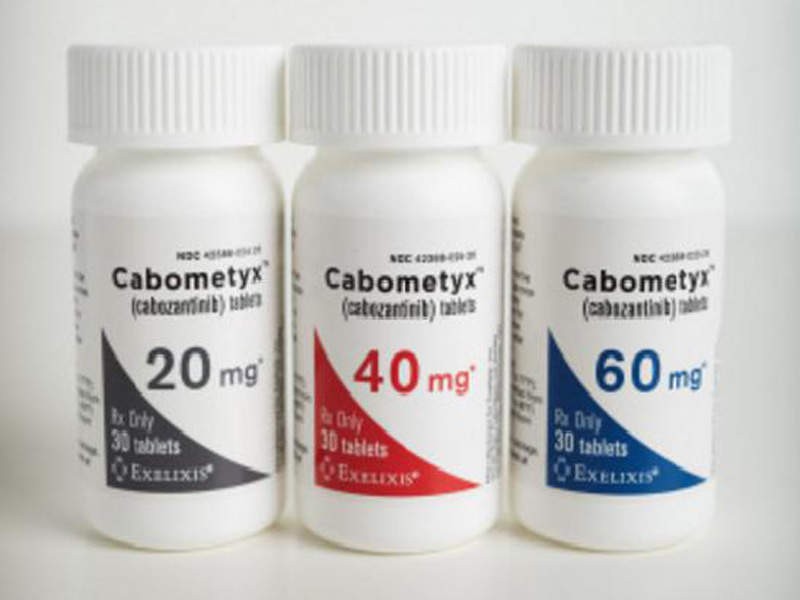
Contents
- 1 Cabometyx (cabozantinib)
- 1.0.1 Side effects of Cabometyx
- 1.0.2 Dosage for Cabometyx
- 1.0.2.1 Important Dosage Information
- 1.0.2.2 Recommended Dosage for Renal Cell Carcinoma
- 1.0.2.3 Recommended Dosage for Hepatocellular Carcinoma
- 1.0.2.4 Dosage Modifications for Adverse Reactions
- 1.0.2.5 Dosage Modifications for Co-administration with CYP3A4 Inhibitors
- 1.0.2.6 Dosage Modifications for Co-administration with CYP3A4 Inducers
- 1.0.2.7 Dosage Modifications for Patients with Moderate and Severe Hepatic Impairment
- 1.0.3 Drug Interactions with Cabometyx
- 1.0.4 Use of Cabometyx While Pregnant or Breastfeeding
- 1.0.5 Summary
Cabometyx (cabozantinib)
Cabometyx (cabozantinib) is a prescription medicine used to treat advanced kidney cancer (renal cell carcinoma) and liver cancer (hepatocellular carcinoma) in patients previously treated with sorafenib.
The safety and effectiveness of Cabometyx in children are unknown.
Side effects of Cabometyx
Cabometyx may cause serious side effects, including:
- Bleeding (hemorrhage): Cabometyx can cause severe bleeding. Seek medical attention immediately if you experience coughing up blood, vomiting blood or coffee-grounds-like vomit, heavier than normal menstrual bleeding, or any unusual or heavy bleeding.
- Swelling or pain in arms or legs
- Shortness of breath
- Feeling lightheaded or faint
- Sweating more than usual
- Numbness or weakness of face, arm, or leg, especially on one side of the body
- Sudden confusion, trouble speaking or understanding
- Sudden trouble seeing in one or both eyes
- Sudden trouble walking
- Dizziness, loss of balance, or coordination
- Sudden severe headache
- Stop taking Cabometyx at least 3 weeks before planned surgery.
- Your healthcare provider will inform you when to restart Cabometyx after surgery.
Your dose of Cabometyx may be adjusted or treatment may be stopped if you experience certain side effects.
The most common side effects of Cabometyx include tiredness, decreased appetite, weight loss, nausea, vomiting, and changes in certain blood tests.
Contact your healthcare provider if you have any bothersome or persistent side effects.
These are not all the possible side effects of Cabometyx. Consult your doctor for medical advice regarding side effects. You may also report side effects to the FDA at 1-800-FDA-1088.
Dosage for Cabometyx
Important Dosage Information
- Discontinue Cabometyx at least 3 weeks before scheduled surgery, including dental surgery.
- Avoid substituting Cabometyx tablets with cabozantinib capsules.
- Administer Cabometyx at least 1 hour before or 2 hours after eating.
- Swallow Cabometyx tablets whole, do not crush them.
- If you miss a dose, do not take it within 12 hours of the next dose.
- Modify the dose for patients with hepatic impairment or taking drugs that strongly induce or inhibit CYP450.
Recommended Dosage for Renal Cell Carcinoma
The recommended dosage of Cabometyx as a single agent is 60 mg once daily without food until clinical benefit ceases or unacceptable toxicity occurs.
For combination therapy with nivolumab, please refer to the provided table for the recommended dosage and duration:
Table 1: Recommended Dosage of Cabometyx in Combination with Nivolumab
| Recommended Dosage | Duration of Therapy |
| Cabometyx 40 mg once daily without food | Until disease progression or unacceptable toxicity |
| Nivolumab 240 mg every 2 weeks (30-minute intravenous infusion) or 480 mg every 4 weeks (30-minute intravenous infusion) | Until disease progression or unacceptable toxicity for up to 2 years |
Recommended Dosage for Hepatocellular Carcinoma
The recommended dosage of Cabometyx is 60 mg once daily without food until disease progression or unacceptable toxicity.
Dosage Modifications for Adverse Reactions
Withhold Cabometyx for:
- Intolerable Grade 2 adverse reactions
- Grade 3 or 4 adverse reactions
- Osteonecrosis of the jaw
Once the adverse reaction improves or resolves, reduce the dose according to the provided table:
Table 2: Recommended Dosage Reductions for Cabometyx for Adverse Reactions
| Recommended Dosage | First Dosage Reduction To | Second Dosage Reduction To |
| Cabometyx 60 mg daily | 40 mg daily | 20 mg daily* |
| Cabometyx 40 mg daily in combination with nivolumab | 20 mg daily | 20 mg every other day* |
| *If previously receiving the lowest dose, resume at the same dose. If the lowest dose is not tolerated, discontinue Cabometyx. | ||
Permanently discontinue Cabometyx for:
- Severe hemorrhage
- Development of gastrointestinal (GI) perforation or Grade 4 fistula
- Acute myocardial infarction or arterial or venous thromboembolic events requiring medical intervention
- Severe hypertension resistant to treatment or hypertensive crisis
- Nephrotic syndrome
- Reversible posterior leukoencephalopathy syndrome
Refer to the provided table for specific dosage modifications for hepatic adverse reactions when administering Cabometyx in combination with nivolumab.
For the treatment of advanced RCC in combination with nivolumab, refer to the prescribing information for nivolumab.
Dosage Modifications for Co-administration with CYP3A4 Inhibitors
- Reduce the daily Cabometyx dose by 20 mg (e.g., from 60 mg to 40 mg daily or from 40 mg to 20 mg daily). Resume the dose used before initiating the strong CYP3A4 inhibitor 2 to 3 days after discontinuing the inhibitor.
Dosage Modifications for Co-administration with CYP3A4 Inducers
- Increase the daily Cabometyx dose by 20 mg (e.g., from 60 mg to 80 mg daily or from 40 mg to 60 mg daily) as tolerated. Resume the dose used before initiating the strong CYP3A4 inducer 2 to 3 days after discontinuing the inducer. Do not exceed a daily dose of 80 mg.
Dosage Modifications for Patients with Moderate and Severe Hepatic Impairment
- Start Cabometyx at a dose of 40 mg once daily in patients with moderate hepatic impairment (Child-Pugh B). Avoid Cabometyx in patients with severe hepatic impairment (Child-Pugh C).
Drug Interactions with Cabometyx
Effects of Other Drugs on Cabometyx
Strong CYP3A4 Inhibitors
- Co-administration of cabozantinib with a strong CYP3A4 inhibitor increases cabozantinib exposure, potentially leading to increased risk of adverse reactions. Avoid co-administration of Cabometyx with strong CYP3A4 inhibitors.
- Reduce the Cabometyx dosage if co-administration with strong CYP3A4 inhibitors cannot be avoided.
- Avoid grapefruit or grapefruit juice, as they may also increase cabozantinib exposure.
Strong CYP3A Inducers
- Co-administration of cabozantinib with a strong CYP3A4 inducer decreases cabozantinib exposure, which may reduce its efficacy.
- Avoid co-administration of Cabometyx with strong CYP3A4 inducers. Increase the Cabometyx dosage if co-administration cannot be avoided. Avoid St. John’s wort, as it may decrease cabozantinib exposure.
Use of Cabometyx While Pregnant or Breastfeeding
- Cabometyx may cause fetal harm when administered to pregnant women, based on animal studies and its mechanism of action.
- No data are available regarding the presence of cabozantinib or its metabolites in human milk or their effects on breastfeeding infants or milk production.
- Due to the potential for serious adverse reactions in breastfed infants, breastfeeding is not recommended during Cabometyx treatment and for 4 months after the final dose.
Summary
Cabometyx (cabozantinib) is a prescription medicine used to treat advanced kidney cancer (renal cell carcinoma) and liver cancer (hepatocellular carcinoma) in patients previously treated with sorafenib. Serious side effects of Cabometyx include bleeding (hemorrhage), stomach or intestinal wall tear or fistula, blood clots, stroke, heart attack, and chest pain.
Ensure you follow the provided guidelines regarding dosage, side effects, drug interactions, and use during pregnancy or breastfeeding. Seek medical advice for personalized information.


